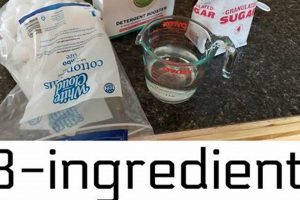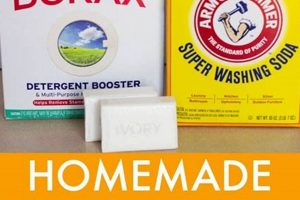The ability to locate and utilize a self-service vehicle cleaning facility in one’s vicinity provides an accessible option for individuals preferring to personally manage the maintenance and appearance of their automobiles. This approach contrasts with automated car washes or professional detailing services, offering more control over the process and products used.
This practice holds value for vehicle owners seeking to minimize expenses, apply specialized cleaning techniques, or simply derive satisfaction from a hands-on approach to car care. Historically, access to such facilities has empowered individuals to maintain their vehicles independent of commercial services, fostering a sense of self-reliance and vehicle stewardship. Furthermore, this approach enables targeted cleaning of specific areas requiring attention, unlike the standardized processes of automated washes.
Understanding the factors to consider when choosing a suitable location, the equipment typically available, best practices for self-service car washing, and the associated costs are critical for optimizing the experience. This exploration will examine each of these elements, providing a detailed overview for individuals interested in this method of vehicle maintenance.
Tips for Optimal Self-Service Vehicle Cleaning
Employing a strategic approach can significantly enhance the effectiveness and efficiency of self-service car washing. The following guidance is intended to optimize the cleaning process and minimize potential damage to the vehicle’s finish.
Tip 1: Pre-Soak Thoroughly: Prior to initiating the washing process, a comprehensive pre-soak is essential. This loosens accumulated dirt, grime, and road salt, facilitating easier removal during subsequent steps. Even distribution of the pre-soak solution is critical for optimal results.
Tip 2: Utilize Appropriate Water Pressure: Employ the appropriate water pressure settings for each stage of the cleaning process. High pressure is suitable for initial rinsing and removing stubborn debris, while lower pressure is preferable for applying soap and wax to prevent damage to the paint.
Tip 3: Maintain Nozzle Distance: Consistently maintain a safe distance between the nozzle and the vehicle’s surface. Holding the nozzle too close can result in paint damage, particularly at high pressure. Experiment with distances to find the optimal balance between cleaning power and surface protection.
Tip 4: Select Quality Cleaning Products: The use of high-quality, pH-balanced car wash soap is imperative. Avoid household detergents, as these can strip away wax and potentially damage the vehicle’s paint. Invest in products specifically formulated for automotive cleaning.
Tip 5: Focus on Heavily Soiled Areas: Allocate additional time and attention to areas with heavy soiling, such as wheel wells, lower body panels, and the front bumper. Pre-treating these areas with a bug and tar remover can further enhance the cleaning process.
Tip 6: Rinse from Top to Bottom: Always rinse the vehicle from top to bottom, allowing gravity to assist in the removal of soap and dirt. This prevents re-deposition of contaminants on previously cleaned surfaces.
Tip 7: Spot-Free Rinse is Crucial: Opt for the spot-free rinse option if available. This utilizes deionized water, which minimizes water spots and eliminates the need for manual drying, saving time and effort while improving the final appearance.
These tips represent fundamental best practices for achieving a superior clean at a self-service car wash. Consistent application of these techniques will contribute to the long-term preservation of the vehicle’s finish and overall appearance.
The subsequent sections will address common challenges encountered during self-service vehicle cleaning and provide effective solutions for overcoming them.
1. Proximity and Accessibility
The viability of utilizing a self-service vehicle cleaning facility is intrinsically linked to its geographic location and ease of access. The term “diy car wash near me” directly emphasizes this dependency, reflecting the prioritization of convenience in the consumer’s decision-making process. Increased distance translates to elevated time and fuel costs, effectively diminishing the attractiveness of the service, irrespective of its quality or price point. For example, a facility offering superior cleaning solutions and lower rates becomes less appealing if located significantly further than a comparable, albeit slightly more expensive, option closer to the vehicle owner’s residence or place of work.
Accessibility encompasses factors beyond mere physical distance. Traffic patterns, parking availability, and operating hours significantly impact the ease with which a facility can be used. A “diy car wash” situated on a congested thoroughfare or lacking adequate parking spaces, even if geographically close, presents a practical deterrent. Likewise, facilities with limited operating hours may not align with the schedules of potential customers, rendering them inaccessible despite their proximity. Facilities that are well lit and have ease access are key for drivers to choose and easy to return.
Therefore, the true value proposition of a self-service vehicle cleaning facility is a function of both its physical nearness and the practical effort required to access and utilize its services. Facilities that optimize both proximity and ease of access stand to maximize their appeal and capture a larger share of the market. Addressing potential barriers such as traffic congestion, limited parking, and restrictive operating hours is crucial for translating geographic proximity into actual customer utilization and retention.
2. Equipment Functionality
The operational status of equipment at a self-service vehicle cleaning facility directly influences its value proposition. The phrase “diy car wash near me” implies a search for convenient and effective vehicle maintenance. If essential equipment, such as high-pressure sprayers, soap dispensers, or tire cleaner applicators, malfunctions or operates sub-optimally, the facility fails to meet customer expectations, despite its advantageous location. A common scenario involves a high-pressure sprayer with inconsistent water pressure, which compromises the thoroughness of the cleaning process. Another example is a soap dispenser that delivers insufficient soap, hindering the removal of dirt and grime. Such equipment deficiencies negate the benefits of proximity and convenience, potentially driving customers to alternative facilities.
Maintenance and routine inspections of equipment are crucial for ensuring consistent performance. Facilities that prioritize preventative maintenance minimize downtime and maintain the functionality of essential components. This proactive approach translates to a superior customer exp
erience, reinforcing the positive association between the location and reliable service. In contrast, a facility with frequently malfunctioning equipment creates frustration and diminishes customer satisfaction, leading to negative word-of-mouth and reduced patronage. For instance, a self-service bay with a perpetually broken vacuum cleaner limits the ability to thoroughly clean the interior of the vehicle, thus negatively impacting the overall service offered.
In summary, the practical significance of functional equipment cannot be overstated in the context of “diy car wash near me”. It constitutes a core element of the customer experience, directly impacting the effectiveness and efficiency of the vehicle cleaning process. Facilities that prioritize equipment maintenance and ensure its consistent functionality are better positioned to attract and retain customers, maximizing the value derived from their convenient location. Conversely, neglecting equipment maintenance undermines the perceived benefits of proximity and ultimately detracts from the facility’s overall competitiveness.
3. Water Pressure Options
The availability and control of water pressure settings at a self-service vehicle cleaning facility directly correlate with its effectiveness and the potential for vehicle damage. The phrase “diy car wash near me” implies a consumer preference for personalized control, which extends to the ability to adjust water pressure based on the cleaning task and vehicle surface.
- Paint Integrity
Excessive water pressure can inflict damage on a vehicle’s paint, particularly on older or poorly maintained finishes. Blistering, chipping, or removal of wax coatings are potential consequences. Variable water pressure options allow users to select lower settings for delicate areas, such as trim or emblems, mitigating the risk of damage. A facility lacking such options presents an elevated risk to the vehicle’s exterior, diminishing its attractiveness.
- Effective Cleaning
Conversely, insufficient water pressure compromises the ability to effectively remove embedded dirt, grime, and road salt. Higher pressure settings are often necessary to dislodge stubborn contaminants from wheel wells or lower body panels. A “diy car wash” facility with inadequate pressure may require extended cleaning times and increased effort to achieve satisfactory results. The absence of adjustable pressure hinders the effective application of pre-soak solutions and detergents, reducing their efficacy.
- Rinse Quality
The final rinse stage necessitates sufficient water pressure to remove residual soap and cleaning agents completely. Inadequate pressure can leave behind soap film or water spots, detracting from the vehicle’s appearance and potentially attracting dirt. A facility offering a dedicated “spot-free rinse” function, utilizing deionized water delivered at appropriate pressure, enhances the overall cleaning outcome and reduces the need for manual drying.
- Equipment Maintenance
Proper functioning of the water pressure system is indicative of a facility’s overall maintenance standards. Fluctuating or unreliable pressure suggests potential equipment malfunctions, reflecting negatively on the facility’s commitment to providing consistent service. A “diy car wash” that invests in regular equipment maintenance ensures reliable water pressure, reinforcing its value proposition and attracting customers seeking a dependable cleaning experience.
The range of water pressure options available, therefore, represents a critical element of the “diy car wash near me” experience. It directly impacts the efficacy of the cleaning process, the potential for vehicle damage, and the overall perception of the facility’s quality and commitment to customer satisfaction. Facilities that prioritize adjustable and well-maintained water pressure systems offer a distinct advantage in a competitive market.
4. Product Availability
The availability of appropriate cleaning products at a self-service vehicle cleaning facility significantly influences its practicality and appeal. The phrase “diy car wash near me” suggests a desire for convenient, self-directed vehicle maintenance, and access to necessary cleaning agents is integral to fulfilling this need.
- Soap Selection
The provision of various soap options allows users to address specific cleaning requirements. A basic, general-purpose soap may suffice for routine cleaning, while specialized formulas, such as those designed for removing bug splatter or tar, cater to more challenging cleaning tasks. Facilities offering a wider selection demonstrate a commitment to providing a comprehensive cleaning experience, enhancing their attractiveness to discerning customers. The absence of specialized soaps necessitates the use of personal cleaning products, potentially increasing the inconvenience associated with self-service washing.
- Wax Application
Many self-service facilities offer a wax application option as part of their cleaning cycle. This feature provides a convenient means of enhancing the vehicle’s shine and protecting the paint from environmental elements. The availability of wax application can be a deciding factor for customers seeking to maintain their vehicle’s appearance without incurring the expense of professional detailing. The efficacy of the wax application is directly related to the quality of the wax product used, highlighting the importance of product selection by the facility operator.
- Tire and Wheel Cleaners
Tire and wheel cleaning products are essential for achieving a thorough vehicle cleaning. These specialized cleaners effectively remove brake dust, grime, and road debris from tires and wheels, enhancing their appearance. The presence of a dedicated tire and wheel cleaner option at a “diy car wash” facility streamlines the cleaning process and eliminates the need for users to bring their own products. The effectiveness of these cleaners depends on their formulation and application method, underscoring the importance of providing high-quality, readily accessible products.
- Spot-Free Rinse Additives
The inclusion of additives in the spot-free rinse cycle minimizes water spots and enhances the vehicle’s final appearance. These additives, often deionized water or specialized drying agents, promote rapid water evaporation and reduce the formation of mineral deposits. The availability of a spot-free rinse option improves the overall cleaning outcome and reduces the time and effort required for manual drying. The effectiveness of these additives depends on their concentration and the quality of the water used in the rinse cycle.
The range and quality of cleaning products available at a “diy car wash near me” directly impact the user’s experience and the effectiveness of the cleaning process. Facilities that prioritize product selection and offer a comprehensive range of high-quality options are better positioned to attract and retain customers seeking a convenient and effective self-service vehicle cleaning solution. The convenience of having all necessary products readily available enhances the appeal of these facilities, reinforcing the value proposition of “diy car wash near me”.
5. Pricing Structure
The pricing structure of a self-service vehicle cleaning facility directly influences its appeal and competitiveness within the context of “diy car wash near me.” Cost is a primary factor in consumer decision-making, and the perceived value of the service, relative to its price, determines its attractiveness. A transparent and competitive pricing model is crucial for attracting and retaining customers.
The pricing model typically involves a per-unit-time charge, allowing users to control the duration and intensity of their cleaning process. The cost per minute often varies based on the selected function, such as soap application, rinsing, or waxing. Real-life examples demonstrate that facilities with excessively high per-minute rates, even if geographically convenient, deter cost-conscious consumers. Conversely, unusually low rates may raise concerns about the quality of cleaning products or equipment maintenance. A balanced approach, aligning pricing with the perceived value and quality of the service, is essential.
Understanding the practical significance of pricing structure enables consumers to make informed decisions. It allows for a comparison of different facilities based on their cost-effectiveness and the services offered. Furthermore, it empowers users to manage their cleaning time efficiently, optimizing their expenditures and minimizing unnecessary costs. Facilities that offer flexible payment options, such as cash, credit card, or mobile payment, enhance convenience and broaden their accessibility. Ultimately, a well-designed and transparent pricing structure contributes significantly to the overall success and customer satisfaction of a “diy car wash near me.”
Frequently Asked Questions Regarding Self-Service Vehicle Cleaning Facilities
The following section addresses common inquiries and clarifies prevalent misconceptions concerning self-service vehicle cleaning facilities, offering factual and impartial information.
Question 1: What are the fundamental advantages of utilizing a self-service vehicle cleaning facility compared to automated car washes?
Self-service facilities offer enhanced control over the cleaning process, enabling targeted attention to specific areas and the selection of preferred cleaning products. Automated car washes, while convenient, provide a standardized cleaning procedure, potentially overlooking specific areas of concern or employing harsh chemicals.
Question 2: How can potential paint damage be minimized when using high-pressure sprayers at a self-service facility?
Maintaining a safe distance between the sprayer nozzle and the vehicle’s surface is crucial. Utilizing the lowest effective pressure setting for each cleaning stage and avoiding prolonged exposure to concentrated spray on any single area will mitigate the risk of paint damage.
Question 3: Are the cleaning products provided at self-service facilities safe for all vehicle paint types?
While most facilities offer pH-balanced soaps designed to be safe for automotive finishes, it is advisable to inquire about the specific products used. Individuals with specialized paint coatings or concerns about product compatibility may opt to bring their own approved cleaning solutions.
Question 4: How does the cost of self-service vehicle cleaning compare to professional detailing services?
Self-service cleaning typically represents a significantly more economical option than professional detailing. However, the level of detail and thoroughness achieved may vary depending on the individual’s effort and expertise. Professional detailing offers a comprehensive service, often including interior cleaning, paint correction, and protective coatings.
Question 5: What measures are in place at self-service facilities to ensure environmentally responsible wastewater disposal?
Reputable self-service facilities are equipped with drainage systems that collect and treat wastewater before it is discharged, preventing harmful chemicals from entering the environment. These systems often include filtration and separation processes to remove contaminants.
Question 6: What are the typical operating hours of self-service vehicle cleaning facilities?
Operating hours vary depending on the specific facility and its location. Many facilities offer extended hours, including 24-hour access, to accommodate diverse schedules. It is recommended to verify the operating hours of a specific facility before visiting.
These answers provide a baseline understanding of self-service vehicle cleaning, empowering individuals to make informed choices regarding their vehicle maintenance practices.
The subsequent section will explore advanced techniques and specialized cleaning procedures for achieving professional-quality results at self-service facilities.
In Conclusion
The preceding analysis has explored diverse facets of locating and utilizing “diy car wash near me.” Key considerations include proximity, equipment functionality, water pressure control, product availability, and pricing transparency. Optimizing these elements contributes to a more efficient and satisfactory vehicle cleaning experience.
The capacity to effectively maintain a vehicle’s cleanliness and appearance through self-service methods remains a valuable asset for conscientious vehicle owners. By carefully evaluating the features and operational standards of nearby facilities, individuals can make informed decisions that align with their needs and budgetary constraints, thereby ensuring the longevity and aesthetic appeal of their vehicles. Continued advancements in cleaning technology and facility management practices are anticipated to further enhance the self-service vehicle cleaning experience in the future.




![Alaskan DIY: Build Your Chainsaw Mill [Guide] The DIY Hub: Creative Crafts, Repairs & Life Hacks Alaskan DIY: Build Your Chainsaw Mill [Guide] | The DIY Hub: Creative Crafts, Repairs & Life Hacks](https://craftingdiycenter.com/wp-content/uploads/2025/07/th-6072-300x200.jpg)


